[PDF&VCE] Lead2pass Free 200-125 Exam Questions Download 100% Pass 200-125 Exam (226-250)
2016 September Cisco Official New Released 200-125 Dumps in Lead2pass.com! 100% Free Download! 100% Pass Guaranteed! Lead2pass has updated the latest version of Cisco 200-125 exam, which is a hot exam of Cisco certification. It is Lead2pass Cisco 200-125 exam dumps that give you confidence to pass this certification exam in first attempt and with maximized score. Following questions and answers are all new published by Cisco Official Exam Center: http://www.lead2pass.com/200-125.html 4 1 QUESTION 226
What is known as "one-to-nearest" addressing in IPv6? A. global unicast
B. anycast
C. multicast
D. unspecified address 
Answer: B
Explanation:
IPv6 Anycast addresses are used for one-to-nearest communication, meaning an Anycast address is used by a device to send data to one specific recipient (interface) that is the closest out of a group of recipients (interfaces). QUESTION 227
What is the first 24 bits in a MAC address called? A. NIC
B. BIA
C. OUI
D. VAI Answer: C
Explanation:
An Organizationally Unique Identifier (OUI) is a 24-bit number that uniquely identifies a vendor, manufacturer, or other organization globally or worldwide. They are used as the first 24 nits of the MAC address to uniquely identify a particular piece of equipment. QUESTION 228
Refer to the exhibit. Which subnet mask will place all hosts on Network B in the same subnet with the least amount of wasted addresses?
 A. 255.255.255.0
B. 255.255.254.0
C. 255.255.252.0
D. 255.255.248.0 Answer: B
Explanation:
310 hosts < 512 = 29 -> We need a subnet mask of 9 bits 0 -> 1111 1111.1111 1111.1111 1110.0000 0000 -> 255.255.254.0 QUESTION 229
Refer to the exhibit. What is the most appropriate summarization for these routes?
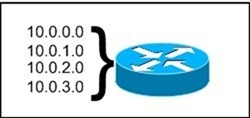 A. 10.0.0.0 /21
B. 10.0.0.0 /22
C. 10.0.0.0 /23
D. 10.0.0.0 /24 Answer: B
Explanation:
The 10.0.0.0/22 subnet mask will include the 10.0.0.0, 10.0.1.0, 10.0.2.0, and 10.0.3.0 networks, and only those four networks. QUESTION 230
What is the difference between a CSU/DSU and a modem? A. A CSU/DSU converts analog signals from a router to a leased line; a modem converts analog signals
from a router to a leased line.
B. A CSU/DSU converts analog signals from a router to a phone line; a modem converts digital signals
from a router to a leased line.
C. A CSU/DSU converts digital signals from a router to a phone line; a modem converts analog signals
from a router to a phone line.
D. A CSU/DSU converts digital signals from a router to a leased line; a modem converts digital signals
from a router to a phone line. Answer: D
Explanation:
CSU/DSU is used to convert digital signals from a router to a network circuit such as a T1, while a modem is used to convert digital signals over a regular POTS line. QUESTION 231
Which two are features of IPv6? (Choose two.) A. anycast
B. broadcast
C. multicast
D. podcast
E. allcast Answer: AC
Explanation:
IPv6 addresses are classified by the primary addressing and routing methodologies common in networkinG. unicast addressing, anycast addressing, and multicast addressing. QUESTION 232
Which two are advantages of static routing when compared to dynamic routing? (Choose two.) A. Configuration complexity decreases as network size increases.
B. Security increases because only the network administrator may change the routing table.
C. Route summarization is computed automatically by the router.
D. Routing tables adapt automatically to topology changes.
E. An efficient algorithm is used to build routing tables, using automatic updates.
F. Routing updates are automatically sent to neighbors.
G. Routing traffic load is reduced when used in stub network links. Answer: BG
Explanation:
Since static routing is a manual process, it can be argued that it is more secure (and more prone to human errors) since the network administrator will need to make changes to the routing table directly. Also, in stub networks where there is only a single uplink connection, the load is reduced as stub routers just need a single static default route, instead of many routes that all have the same next hop IP address. QUESTION 233
A network administrator needs to configure port security on a switch. Which two statements are true? (Choose two.) A. The network administrator can apply port security to dynamic access ports.
B. The network administrator can apply port security to EtherChannels.
C. When dynamic MAC address learning is enabled on an interface, the switch can learn new addresses,
up to the maximum defined.
D. The sticky learning feature allows the addition of dynamically learned addresses to the running configuration.
E. The network administrator can configure static secure or sticky secure MAC addresses in the voice VLAN. Answer: CD
Explanation:
Follow these guidelines when configuring port security:
+ Port security can only be configured on static access ports, trunk ports, or 802.1Q tunnel ports.
+ A secure port cannot be a dynamic access port.
+ A secure port cannot be a destination port for Switched Port Analyzer (SPAN). + A secure port cannot belong to a Fast EtherChannel or Gigabit EtherChannel port group. + You cannot configure static secure or sticky secure MAC addresses on a voice VLAN. + When you enable port security on an interface that is also configured with a voice VLAN, you must set the maximum allowed secure addresses on the port to at least two. + If any type of port security is enabled on the access VLAN, dynamic port security is automatically enabled on the voice VLAN.
+ When a voice VLAN is configured on a secure port that is also configured as a sticky secure port, all addresses seen on the voice VLAN are learned as dynamic secure addresses, and all addresses seen on the access VLAN (to which the port belongs) are learned as sticky secure addresses.
+ The switch does not support port security aging of sticky secure MAC addresses. + The protect and restrict options cannot be simultaneously enabled on an interface.
http://www.cisco.com/en/US/docs/switches/lan/catalyst3550/software/release/12.1_19_ea1/config 2 uration/guide/swtrafc.html QUESTION 234
What are three features of the IPv6 protocol? (Choose three.) A. optional IPsec
B. autoconfiguration
C. no broadcasts
D. complicated header
E. plug-and-play
F. checksums Answer: BCE
Explanation:
An important feature of IPv6 is that it allows plug and play option to the network devices by allowing them to configure themselves independently. It is possible to plug a node into an IPv6 network without requiring any human intervention. This feature was critical to allow network connectivity to an increasing number of mobile devices. This is accomplished by autoconfiguration.
IPv6 does not implement traditional IP broadcast, i.e. the transmission of a packet to all hosts on the attached link using a special broadcast address, and therefore does not define broadcast addresses. In IPv6, the same result can be achieved by sending a packet to the link-local all nodes multicast group at address ff02::1, which is analogous to IPv4 multicast to address 224.0.0.1. QUESTION 235
Which command enables IPv6 forwarding on a Cisco router? A. ipv6 local
B. ipv6 host
C. ipv6 unicast-routing
D. ipv6 neighbor Answer: C
Explanation:
to enable IPv6 routing on the Cisco router use the following command:
ipv6 unicast-routing
If this command is not recognized, your version of IOS does not support IPv6. QUESTION 236
Which command encrypts all plaintext passwords? A. Router# service password-encryption
B. Router(config)# password-encryption
C. Router(config)# service password-encryption
D. Router# password-encryption Answer: C
Explanation:
The "service password-encryption" command allows you to encrypt all passwords on your router so they can not be easily guessed from your running-config. This command uses a very weak
encryption because the router has to be very quickly decode the passwords for its operation.
It is meant to prevent someone from looking over your shoulder and seeing the password, that is all. This is configured in global configuration mode. QUESTION 237
You have been asked to come up with a subnet mask that will allow all three web servers to be on the same network while providing the maximum number of subnets. Which network address and subnet mask meet this requirement? A. 192.168.252.0 255.255.255.252
B. 192.168.252.8 255.255.255.248
C. 192.168.252.8 255.255.255.252
D. 192.168.252.16 255.255.255.240
E. 192.168.252.16 255.255.255.252 Answer: B
Explanation:
A subnet mask of 255.255.255.248 will allow for up to 6 hosts to reside in this network. A subnet mask of 255.255.255.252 will allow for only 2 usable IP addresses, since we can not use the network or broadcast address. QUESTION 238
Given an IP address 172.16.28.252 with a subnet mask of 255.255.240.0, what is the correct network address? A. 172.16.16.0
B. 172.16.0.0
C. 172.16.24.0
D. 172.16.28.0 Answer: A
Explanation:
For this example, the network range is 172.16.16.1 - 172.16.31.254, the network address is 172.16.16.0 and the broadcast IP address is 172.16.31.255. QUESTION 239
Which IPv6 address is the equivalent of the IPv4 interface loopback address 127.0.0.1? A. ::1
B. ::
C. 2000::/3
D. 0::/10 Answer: A
Explanation:
In IPv6 the loopback address is written as,
This is a 128bit number, with the first 127 bits being '0' and the 128th bit being '1'. It's just a single address, so could also be written as ::1/128. QUESTION 240
You are working in a data center environment and are assigned the address range 10.188.31.0/23. You are asked to develop an IP addressing plan to allow the maximum number of subnets with as many as 30 hosts each. Which IP address range meets these requirements? A. 10.188.31.0/26
B. 10.188.31.0/25
C. 10.188.31.0/28
D. 10.188.31.0/27
E. 10.188.31.0/29 Answer: D
Explanation:
Each subnet has 30 hosts < 32 = 25 so we need a subnet mask which has at least 5 bit 0s -> /27. Also the question requires the maximum number of subnets (which minimum the number of hosts- per-subnet) so /27 is the best choice -> . QUESTION 241
Which parameter or parameters are used to calculate OSPF cost in Cisco routers? A. Bandwidth
B. Bandwidth and Delay
C. Bandwidth, Delay, and MTU
D. Bandwidth, MTU, Reliability, Delay, and Load Answer: A
Explanation:
The well-known formula to calculate OSPF cost is Cost = 108 / Bandwidth QUESTION 242
Why do large OSPF networks use a hierarchical design? (Choose three.) A. to decrease latency by increasing bandwidth
B. to reduce routing overhead
C. to speed up convergence
D. to confine network instability to single areas of the network
E. to reduce the complexity of router configuration
F. to lower costs by replacing routers with distribution layer switches Answer: BCD
Explanation:
OSPF implements a two-tier hierarchical routing model that uses a core or backbone tier known as area zero (0). Attached to that backbone via area border routers (ABRs) are a number of secondary tier areas. The hierarchical approach is used to achieve the following:
Rapid convergence because of link and/or switch failures
Deterministic traffic recovery
Scalable and manageable routing hierarchy, reduced routing overhead. QUESTION 243
Drag and Drop Question

Answer:
 QUESTION 244
Drag and Drop Question
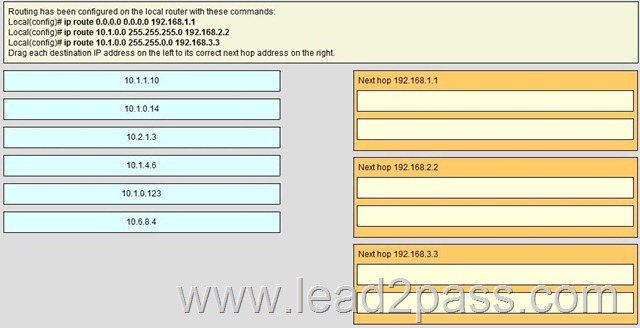
Answer:
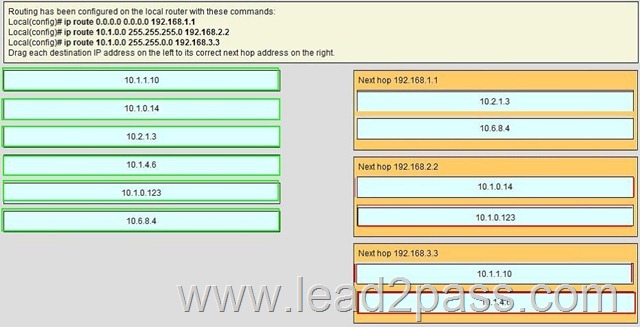 QUESTION 245
Drag and Drop Question

Answer:
 QUESTION 246
Drag and Drop Question

Answer:
 QUESTION 247
Drag and Drop Question
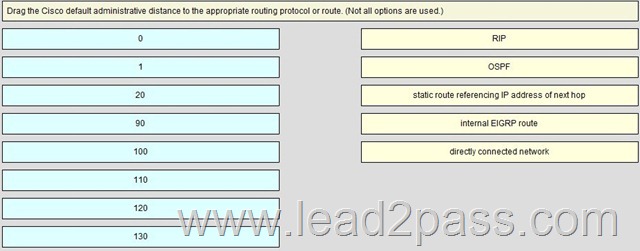
Answer:
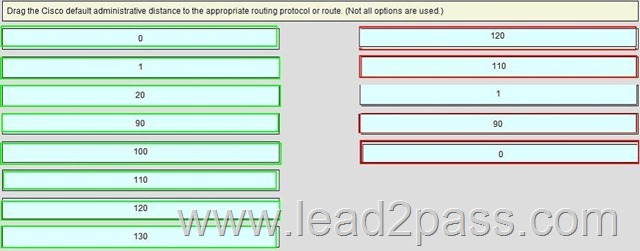 QUESTION 248
Drag and Drop Question
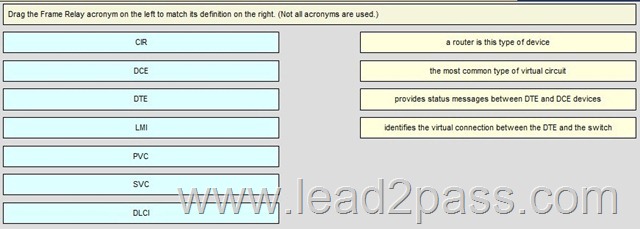
Answer:
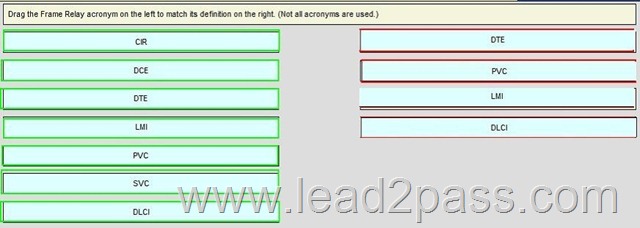 QUESTION 249
Drag and Drop Question

Answer:
 QUESTION 250
Drag and Drop Question
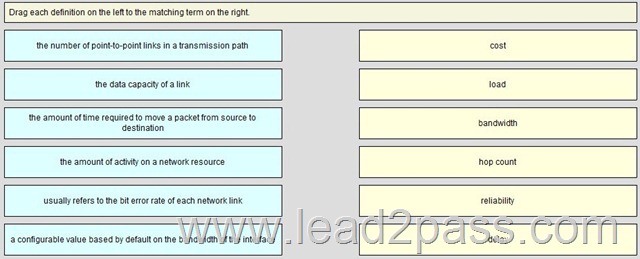
Answer:
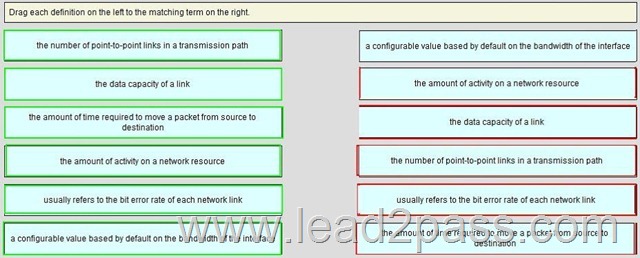 Lead2pass offers you all the 200-125 exam questions which are the same as your real test with 100% correct and coverage rate. We provide the latest full version of 200-125 PDF and VCE dumps to ensure your 200-125 exam 100% pass. 200-125 new questions on Google Drive: https://drive.google.com/open?id=0B3Syig5i8gpDbnNGVlNHTzJjcWc 3 2016 Cisco 200-125 exam dumps (All 545 Q&As) from Lead2pass: http://www.lead2pass.com/200-125.html 4 1 [100% Exam Pass Guaranteed]
|

















